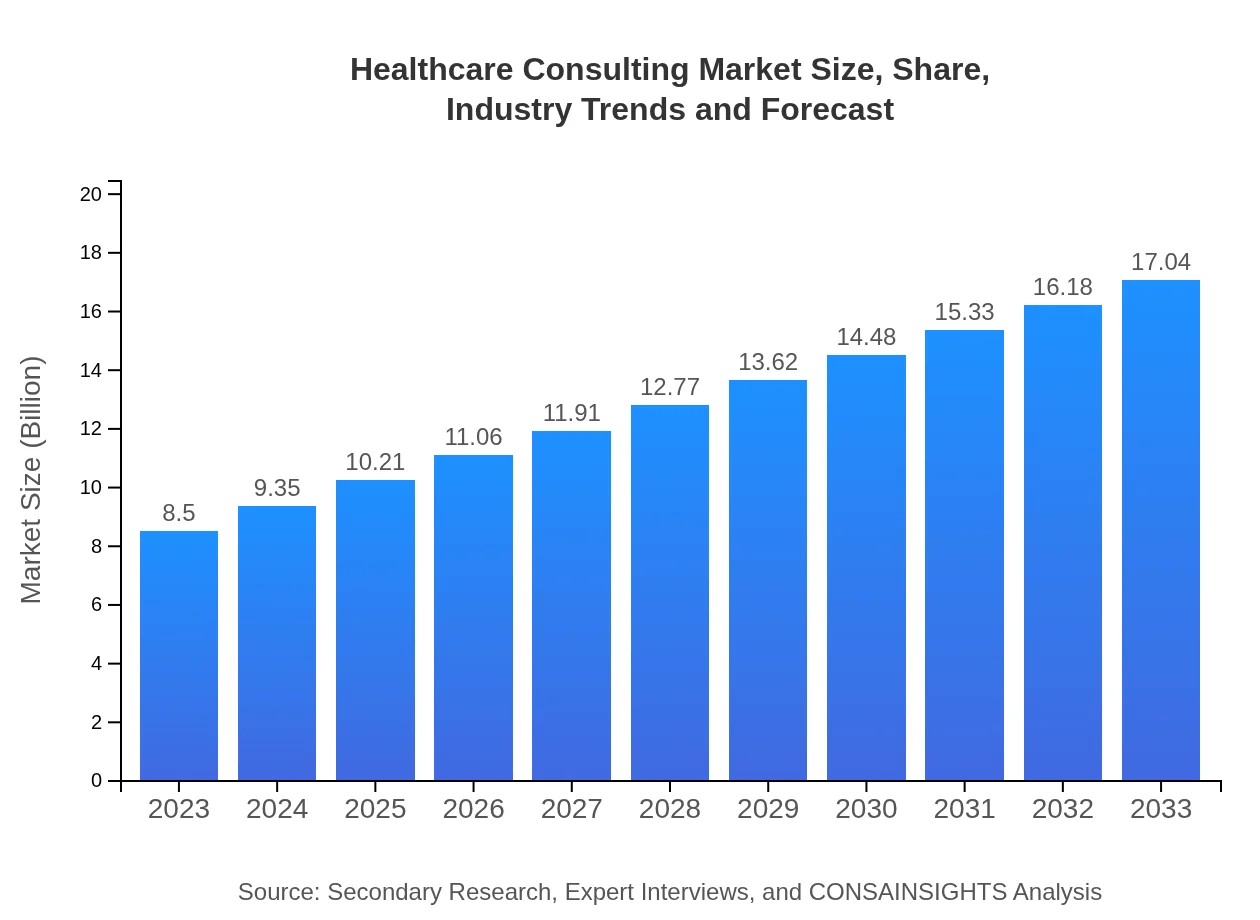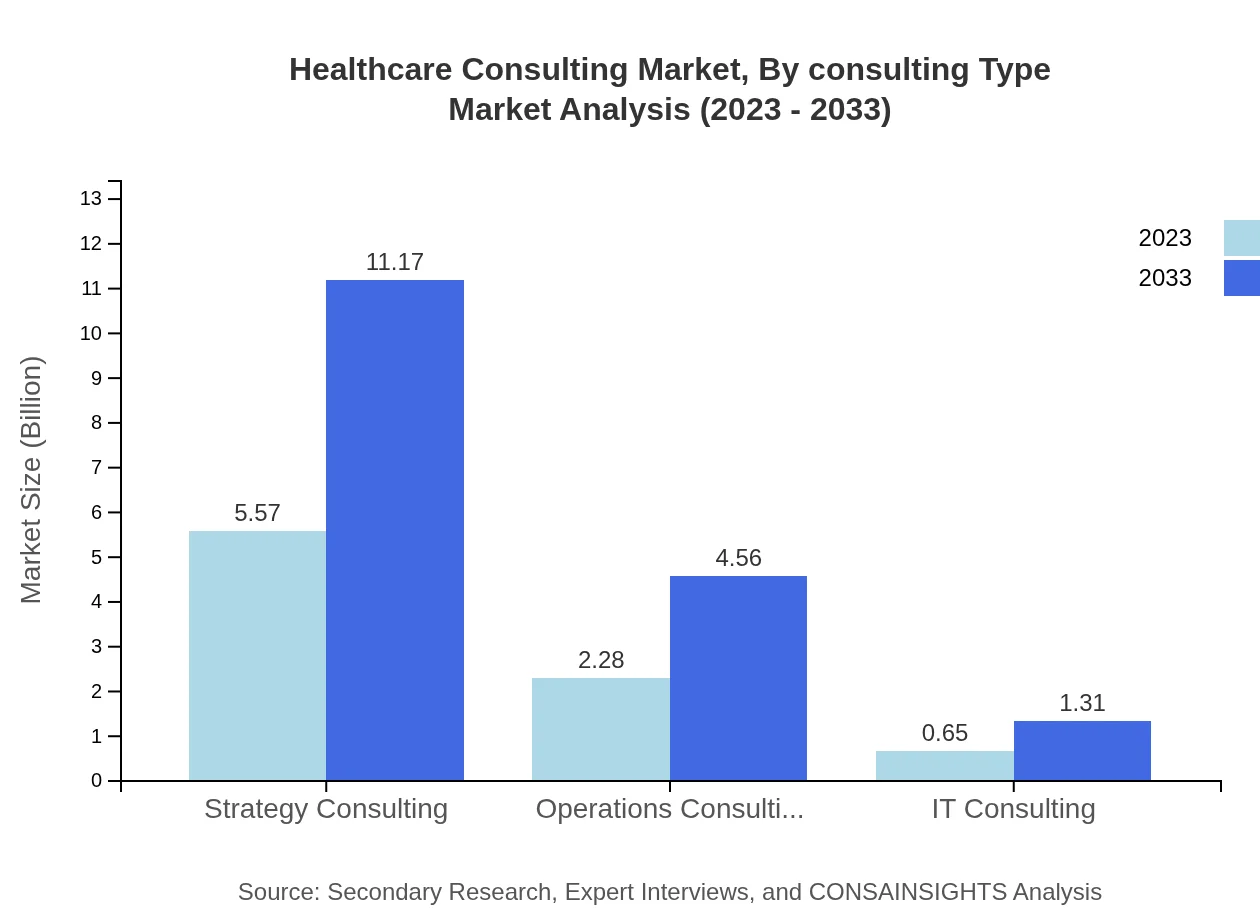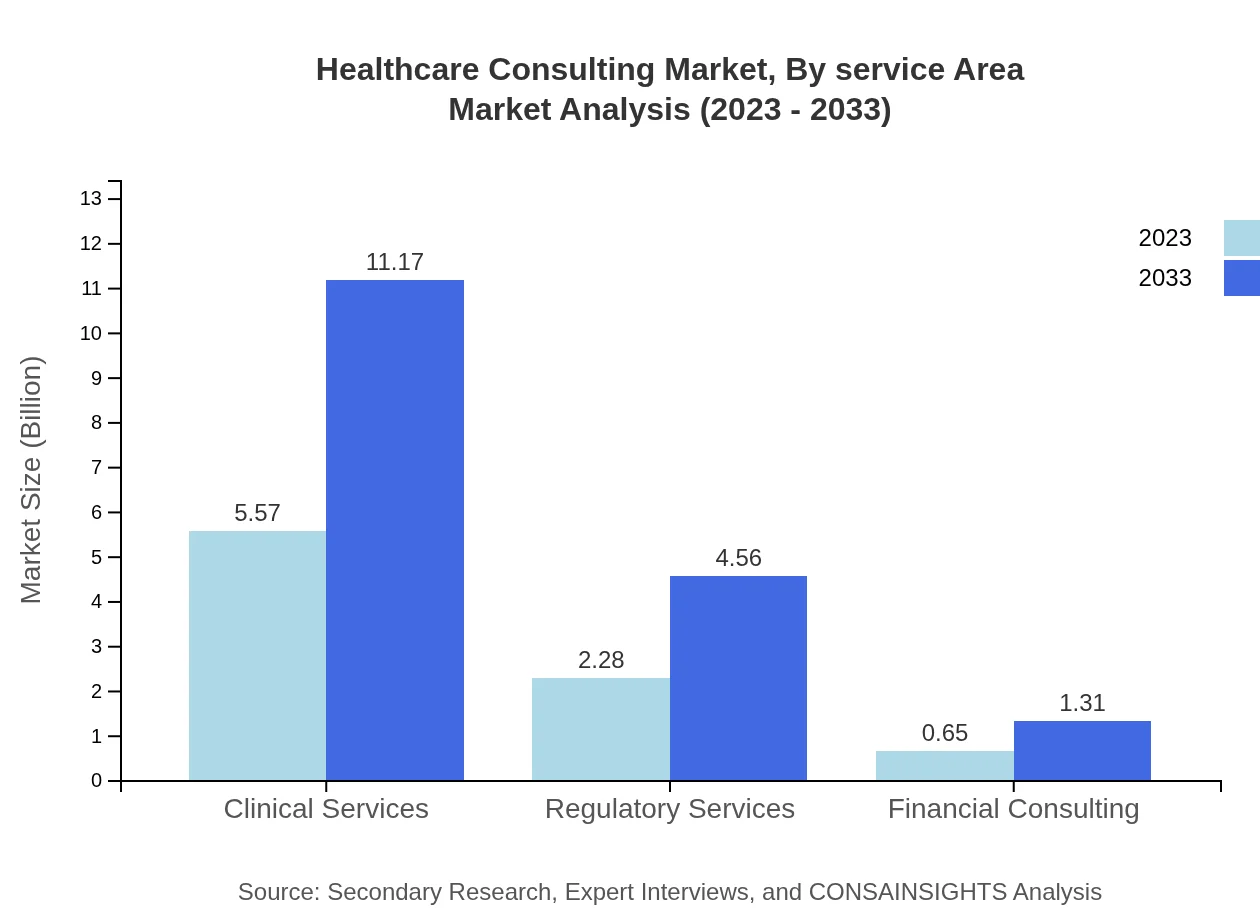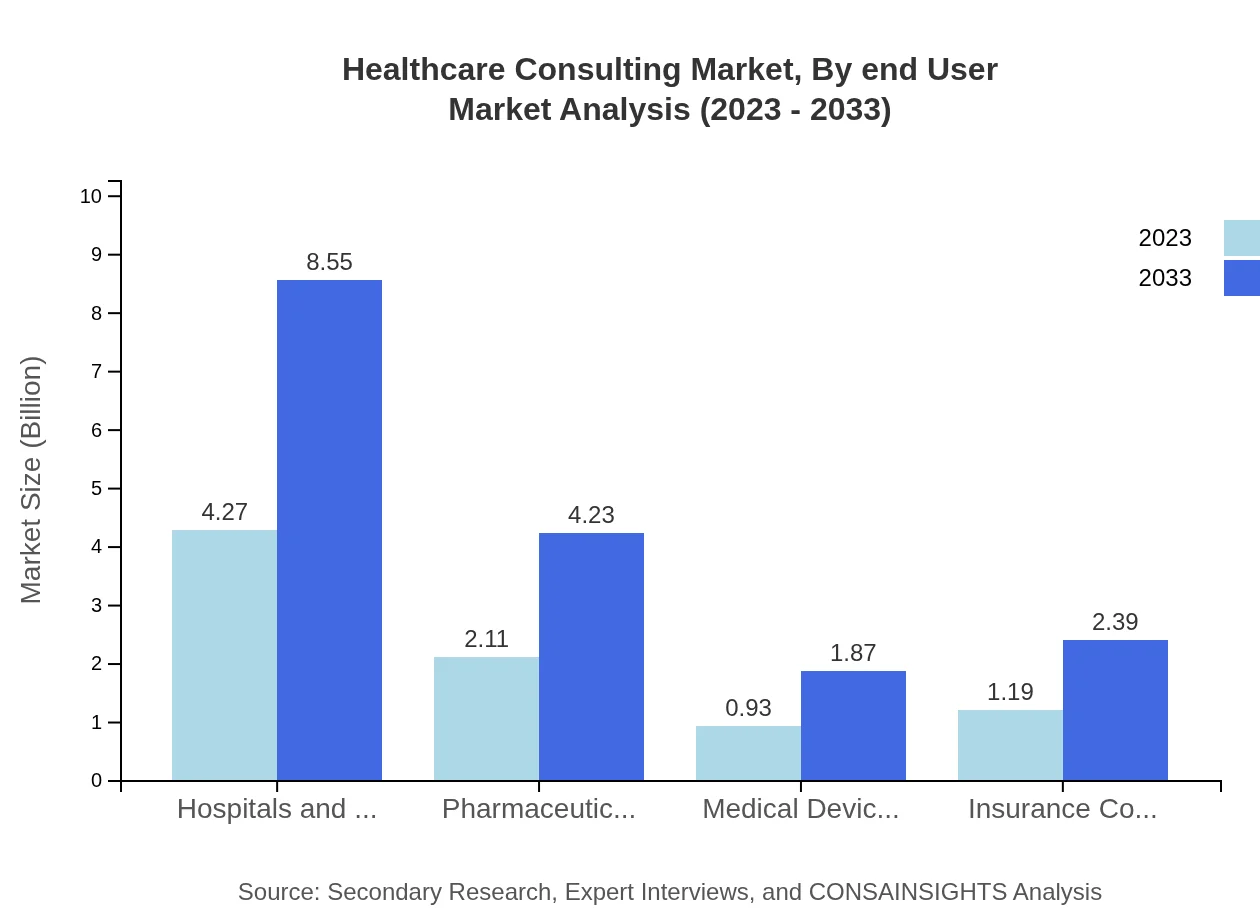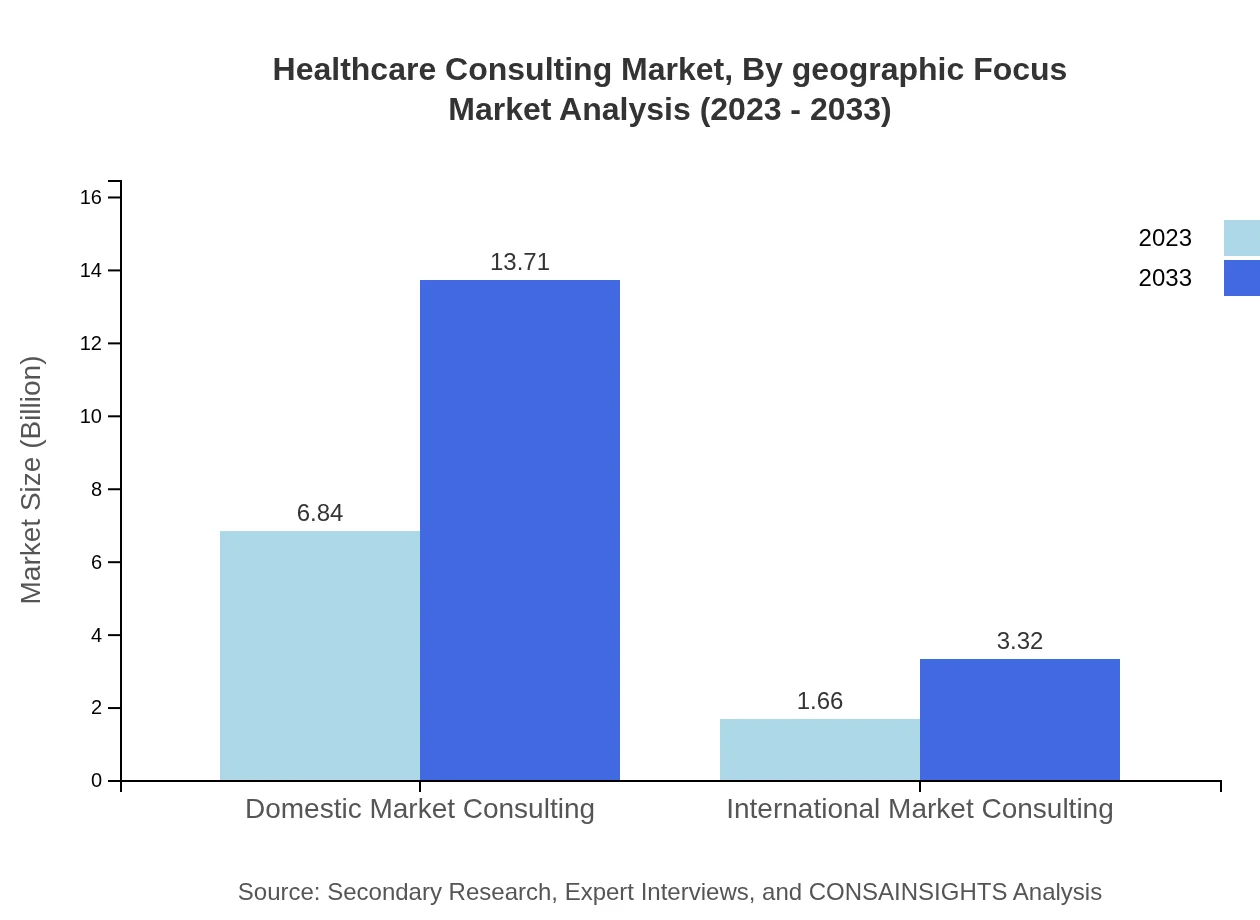Healthcare Consulting Market Report
Published Date: 31 January 2026 | Report Code: healthcare-consulting
Healthcare Consulting Market Size, Share, Industry Trends and Forecast to 2033
This report provides comprehensive insights into the Healthcare Consulting market from 2023 to 2033. It covers market size, growth projections, regional analyses, technological impacts, and key trends shaping the industry.
| Metric | Value |
|---|---|
| Study Period | 2023 - 2033 |
| 2023 Market Size | $8.50 Billion |
| CAGR (2023-2033) | 7.0% |
| 2033 Market Size | $17.04 Billion |
| Top Companies | McKinsey & Company, Deloitte, Accenture, PwC, Boston Consulting Group (BCG) |
| Last Modified Date | 31 January 2026 |
Healthcare Consulting Market Overview
Customize Healthcare Consulting Market Report market research report
- ✔ Get in-depth analysis of Healthcare Consulting market size, growth, and forecasts.
- ✔ Understand Healthcare Consulting's regional dynamics and industry-specific trends.
- ✔ Identify potential applications, end-user demand, and growth segments in Healthcare Consulting
What is the Market Size & CAGR of Healthcare Consulting market in 2023?
Healthcare Consulting Industry Analysis
Healthcare Consulting Market Segmentation and Scope
Tell us your focus area and get a customized research report.
Healthcare Consulting Market Analysis Report by Region
Europe Healthcare Consulting Market Report:
The European Healthcare Consulting market is forecasted to rise from $2.38 billion in 2023 to $4.77 billion by 2033. The region experiences a high demand for consulting services due to stringent regulatory requirements and the need for increased operational efficiency in healthcare.Asia Pacific Healthcare Consulting Market Report:
The Asia-Pacific region's Healthcare Consulting market is projected to grow from $1.71 billion in 2023 to $3.43 billion by 2033, driven by rapid urbanization, increasing healthcare expenditures, and a growing geriatric population. The demand for digital health and telehealth solutions also plays a significant role in this growth.North America Healthcare Consulting Market Report:
North America remains the largest market, with expected growth from $3.13 billion in 2023 to $6.27 billion by 2033. This growth is strongly supported by advanced healthcare systems, high healthcare spending, and a significant focus on patient-centered care and outcome optimization.South America Healthcare Consulting Market Report:
In South America, the Healthcare Consulting market is expected to expand from $0.64 billion in 2023 to $1.28 billion by 2033. The growing emphasis on improving healthcare infrastructure and increasing investments in health systems are key factors fueling this market.Middle East & Africa Healthcare Consulting Market Report:
In the Middle East and Africa, the market is projected to grow from $0.64 billion in 2023 to $1.28 billion by 2033, as governments increase investments in healthcare and seek to reform healthcare systems to enhance efficiency and service delivery.Tell us your focus area and get a customized research report.
Healthcare Consulting Market Analysis By Consulting Type
The market shows robust performance across various consulting types. The clinical services segment leads with a market size of $5.57 billion in 2023, growing to $11.17 billion by 2033, holding a 65.54% market share. Strategy consulting follows closely, also commanding significant market presence. Other areas such as regulatory and financial consulting are gaining traction due to increased demands for compliance and financial efficiency.
Healthcare Consulting Market Analysis By Service Area
The Healthcare Consulting market is segmented into various service areas, with a significant focus on operational and strategy consulting. Domestic market consulting holds an 80.49% share in 2023, indicating a strong preference for localized consulting services. Firms are diversifying to encompass international consulting to address global challenges.
Healthcare Consulting Market Analysis By End User
Key end-users of healthcare consulting services include hospitals and health systems, which dominate the market. This sector is projected to grow from $4.27 billion in 2023 to $8.55 billion in 2033, holding 50.18% of the market share.
Healthcare Consulting Market Analysis By Geographic Focus
Firms increasingly focus on geographic expansion, with North America being the leading region. Companies are adapting strategies that cater to regional healthcare demands, with emerging markets in Asia-Pacific and Latin America presenting significant growth opportunities.
Healthcare Consulting Market Trends and Future Forecast
Tell us your focus area and get a customized research report.
Global Market Leaders and Top Companies in Healthcare Consulting Industry
McKinsey & Company:
A leading global management consulting firm that provides expert consulting services to the healthcare sector, focusing on strategy, operations, and financial optimization.Deloitte:
Deloitte offers comprehensive consulting services including healthcare transformation, analytics, and financial advisory, serving a diverse set of healthcare clients globally.Accenture:
Accenture combines technology and consulting expertise to help healthcare organizations improve performance and deliver more effective patient care.PwC:
PwC provides in-depth consulting services focusing on business strategy, risk management, and regulatory compliance in the healthcare industry.Boston Consulting Group (BCG):
BCG assists healthcare clients with strategic planning, marketing, and operations consulting to enhance their market position and efficiency.We're grateful to work with incredible clients.









FAQs
What is the market size of healthcare consulting?
The healthcare consulting market is valued at $8.5 billion in 2023, with a projected CAGR of 7.0% until 2033. This growth underscores the increasing demand for strategic healthcare solutions and improved operational efficiency across global health systems.
What are the key market players or companies in this healthcare consulting industry?
Key players in the healthcare consulting industry include global firms like McKinsey & Company, Deloitte, and Accenture. These companies lead in providing strategic insights and solutions, driving innovations, and enhancing operational efficiencies in healthcare organizations.
What are the primary factors driving the growth in the healthcare consulting industry?
Growth in the healthcare consulting industry is driven by the demand for operational efficiency, regulatory compliance, digital transformation, and improved patient outcomes. Increasing healthcare costs and the need for data analytics also contribute significantly to this sector's expansion.
Which region is the fastest Growing in the healthcare consulting?
The fastest-growing region in healthcare consulting is North America, expected to grow from $3.13 billion in 2023 to $6.27 billion by 2033. This growth is driven by a robust healthcare infrastructure and an increasing focus on innovative health solutions.
Does ConsaInsights provide customized market report data for the healthcare consulting industry?
Yes, ConsaInsights offers customized market report data tailored to the healthcare consulting industry. Clients can request specific insights and analyses to suit their strategic needs, ensuring they receive relevant and actionable market intelligence.
What deliverables can I expect from this healthcare consulting market research project?
Deliverables from the healthcare consulting market research project typically include comprehensive reports, detailed market analyses, trends forecasts, segment breakdowns, and actionable recommendations to support strategic decision-making in the healthcare sector.
What are the market trends of healthcare consulting?
Current market trends in healthcare consulting include increased digital transformation, a focus on patient-centered care, integration of AI and analytics, regulatory compliance strategies, and growing emphasis on operational and financial efficiencies to optimize healthcare delivery.

